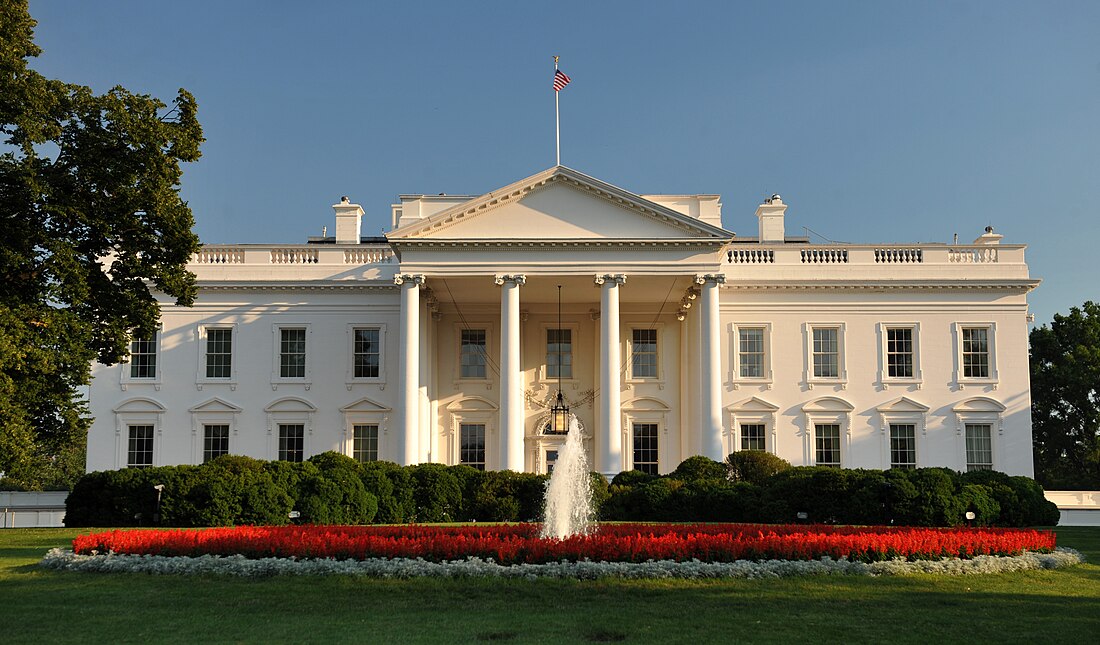List of presidents of the United States
From Wikipedia, the free encyclopedia
The president of the United States is the head of state and head of government of the United States,[1] indirectly elected to a four-year term via the Electoral College.[2] Under the U.S. Constitution, the officeholder leads the executive branch of the federal government and is the commander-in-chief of the United States Armed Forces.[3] The first president, George Washington, won a unanimous vote of the Electoral College.[4] The incumbent president is Donald Trump, who assumed office on January 20, 2025.[5][6] Since the office was established in 1789, 45 men have served in 47 presidencies; the discrepancy arises from two individuals elected to non-consecutive terms: Grover Cleveland is counted as the 22nd and 24th president of the United States, while Donald Trump is counted as the 45th and 47th president.[7][8]
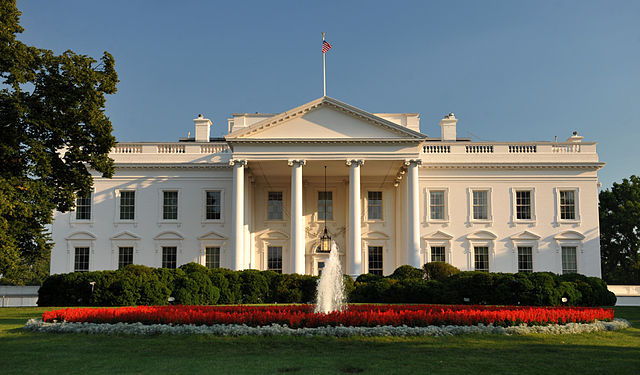
The presidency of William Henry Harrison, who died 31 days after taking office in 1841, was the shortest in American history.[9] Franklin D. Roosevelt served the longest, over twelve years, before dying early in his fourth term in 1945. He is the only U.S. president to have served more than two terms.[10] Since the ratification of the Twenty-second Amendment to the United States Constitution in 1951, no person may be elected president more than twice, and no one who has served more than two years of a term to which someone else was elected may be elected more than once.[11]
Four presidents died in office of natural causes (William Henry Harrison, Zachary Taylor, Warren G. Harding, and Franklin D. Roosevelt), four were assassinated (Abraham Lincoln, James A. Garfield, William McKinley, and John F. Kennedy), and one resigned (Richard Nixon, facing impeachment and removal from office).[12] John Tyler was the first vice president to assume the presidency during a presidential term, setting the precedent that a vice president who does so becomes the fully functioning president with a new, distinct administration.[13]
Throughout most of its history, American politics has been dominated by political parties. The Constitution is silent on the issue of political parties, and at the time it came into force in 1789, no organized parties existed. Soon after the 1st Congress convened, political factions began rallying around dominant Washington administration officials, such as Alexander Hamilton and Thomas Jefferson.[14] Concerned about the capacity of political parties to destroy the fragile unity holding the nation together, Washington remained unaffiliated with any political faction or party throughout his eight-year presidency. He was, and remains, the only U.S. president who never affiliated with a political party.[15]
Presidents
| No.[a] | Portrait | Name (birth–death) |
Term[16] | Party[b][17] | Election | Vice President[18] | |
|---|---|---|---|---|---|---|---|
| 1 |  |
George Washington (1732–1799) [19] |
April 30, 1789 – March 4, 1797 |
Unaffiliated | 1788–89 1792 |
John Adams[c] | |
| 2 |  |
John Adams (1735–1826) [21] |
March 4, 1797 – March 4, 1801 |
Federalist | 1796 | Thomas Jefferson[d] | |
| 3 | 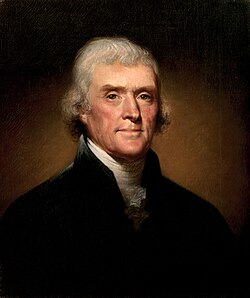 |
Thomas Jefferson (1743–1826) [23] |
March 4, 1801 – March 4, 1809 |
Democratic- Republican |
1800 1804 |
Aaron Burr George Clinton | |
| 4 |  |
James Madison (1751–1836) [24] |
March 4, 1809 – March 4, 1817 |
Democratic- Republican |
1808 1812 |
George Clinton[e] Vacant after April 20, 1812 Elbridge Gerry[e] Vacant after November 23, 1814 | |
| 5 |  |
James Monroe (1758–1831) [26] |
March 4, 1817 – March 4, 1825 |
Democratic- Republican |
1816 1820 |
Daniel D. Tompkins | |
| 6 |  |
John Quincy Adams (1767–1848) [27] |
March 4, 1825 – March 4, 1829 |
Democratic- Republican[f] National Republican |
1824 | John C. Calhoun[g] | |
| 7 |  |
Andrew Jackson (1767–1845) [30] |
March 4, 1829 – March 4, 1837 |
Democratic | 1828 1832 |
John C. Calhoun[h] Vacant after December 28, 1832 Martin Van Buren | |
| 8 |  |
Martin Van Buren (1782–1862) [31] |
March 4, 1837 – March 4, 1841 |
Democratic | 1836 | Richard Mentor Johnson | |
| 9 |  |
William Henry Harrison (1773–1841) [32] |
March 4, 1841 – April 4, 1841[e] |
Whig | 1840 | John Tyler | |
| 10 |  |
John Tyler (1790–1862) [33] |
April 4, 1841[i] – March 4, 1845 |
Whig[j] Unaffiliated |
– | Vacant throughout presidency | |
| 11 |  |
James K. Polk (1795–1849) [36] |
March 4, 1845 – March 4, 1849 |
Democratic | 1844 | George M. Dallas | |
| 12 |  |
Zachary Taylor (1784–1850) [37] |
March 4, 1849 – July 9, 1850[e] |
Whig | 1848 | Millard Fillmore | |
| 13 |  |
Millard Fillmore (1800–1874) [38] |
July 9, 1850[k] – March 4, 1853 |
Whig | – | Vacant throughout presidency | |
| 14 |  |
Franklin Pierce (1804–1869) [40] |
March 4, 1853 – March 4, 1857 |
Democratic | 1852 | William R. King[e] Vacant after April 18, 1853 | |
| 15 |  |
James Buchanan (1791–1868) [41] |
March 4, 1857 – March 4, 1861 |
Democratic | 1856 | John C. Breckinridge | |
| 16 |  |
Abraham Lincoln (1809–1865) [42] |
March 4, 1861 – April 15, 1865[e] |
Republican National Union[l] |
1860 1864 |
Hannibal Hamlin Andrew Johnson | |
| 17 |  |
Andrew Johnson (1808–1875) [44] |
April 15, 1865[m] – March 4, 1869 |
National Union[n] Democratic |
– | Vacant throughout presidency | |
| 18 |  |
Ulysses S. Grant (1822–1885) [45] |
March 4, 1869 – March 4, 1877 |
Republican | 1868 1872 |
Schuyler Colfax Henry Wilson[e] Vacant after November 22, 1875 | |
| 19 |  |
Rutherford B. Hayes (1822–1893) [46] |
March 4, 1877 – March 4, 1881 |
Republican | 1876 | William A. Wheeler | |
| 20 |  |
James A. Garfield (1831–1881) [47] |
March 4, 1881 – September 19, 1881[e] |
Republican | 1880 | Chester A. Arthur | |
| 21 |  |
Chester A. Arthur (1829–1886) [48] |
September 19, 1881[o] – March 4, 1885 |
Republican | – | Vacant throughout presidency | |
| 22 |  |
Grover Cleveland (1837–1908) [50] |
March 4, 1885 – March 4, 1889 |
Democratic | 1884 | Thomas A. Hendricks[e] Vacant after November 25, 1885 | |
| 23 |  |
Benjamin Harrison (1833–1901) [51] |
March 4, 1889 – March 4, 1893 |
Republican | 1888 | Levi P. Morton | |
| 24 |  |
Grover Cleveland (1837–1908) [50] |
March 4, 1893 – March 4, 1897 |
Democratic | 1892 | Adlai Stevenson I | |
| 25 |  |
William McKinley (1843–1901) [52] |
March 4, 1897 – September 14, 1901[e] |
Republican | 1896 1900 |
Garret Hobart[e] Vacant after November 21, 1899 Theodore Roosevelt | |
| 26 |  |
Theodore Roosevelt (1858–1919) [53] |
September 14, 1901[p] – March 4, 1909 |
Republican | – 1904 |
Vacant through March 4, 1905 Charles W. Fairbanks | |
| 27 |  |
William Howard Taft (1857–1930) [55] |
March 4, 1909 – March 4, 1913 |
Republican | 1908 | James S. Sherman[e] Vacant after October 30, 1912 | |
| 28 |  |
Woodrow Wilson (1856–1924) [56] |
March 4, 1913 – March 4, 1921 |
Democratic | 1912 1916 |
Thomas R. Marshall | |
| 29 |  |
Warren G. Harding (1865–1923) [57] |
March 4, 1921 – August 2, 1923[e] |
Republican | 1920 | Calvin Coolidge | |
| 30 |  |
Calvin Coolidge (1872–1933) [58] |
August 2, 1923[q] – March 4, 1929 |
Republican | – 1924 |
Vacant through March 4, 1925 Charles G. Dawes | |
| 31 |  |
Herbert Hoover (1874–1964) [60] |
March 4, 1929 – March 4, 1933 |
Republican | 1928 | Charles Curtis | |
| 32 | 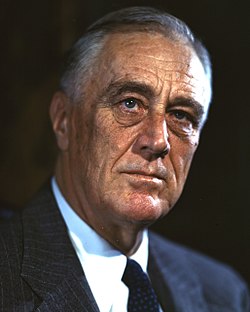 |
Franklin D. Roosevelt (1882–1945) [61] |
March 4, 1933 – April 12, 1945[e] |
Democratic | 1932 1936 1940 1944 |
John Nance Garner Henry A. Wallace Harry S. Truman | |
| 33 | 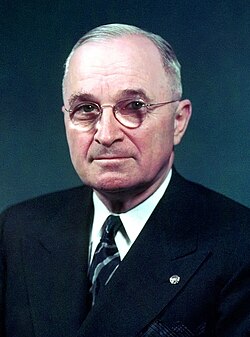 |
Harry S. Truman (1884–1972) [62] |
April 12, 1945[r] – January 20, 1953 |
Democratic | – 1948 |
Vacant through January 20, 1949 Alben W. Barkley | |
| 34 |  |
Dwight D. Eisenhower (1890–1969) [64] |
January 20, 1953 – January 20, 1961 |
Republican | 1952 1956 |
Richard Nixon | |
| 35 |  |
John F. Kennedy (1917–1963) [65] |
January 20, 1961 – November 22, 1963[e] |
Democratic | 1960 | Lyndon B. Johnson | |
| 36 |  |
Lyndon B. Johnson (1908–1973) [66] |
November 22, 1963[s] – January 20, 1969 |
Democratic | – 1964 |
Vacant through January 20, 1965 Hubert Humphrey | |
| 37 |  |
Richard Nixon (1913–1994) [68] |
January 20, 1969 – August 9, 1974[h] |
Republican | 1968 1972 |
Spiro Agnew[h] Vacant: October 10 – December 6, 1973 Gerald Ford[t] | |
| 38 |  |
Gerald Ford (1913–2006) [69] |
August 9, 1974[u] – January 20, 1977 |
Republican | – | Vacant through December 19, 1974 Nelson Rockefeller[t] | |
| 39 |  |
Jimmy Carter (1924–2024) [70] |
January 20, 1977 – January 20, 1981 |
Democratic | 1976 | Walter Mondale | |
| 40 |  |
Ronald Reagan (1911–2004) [71] |
January 20, 1981 – January 20, 1989 |
Republican | 1980 1984 |
George H. W. Bush | |
| 41 |  |
George H. W. Bush (1924–2018) [72] |
January 20, 1989 – January 20, 1993 |
Republican | 1988 | Dan Quayle | |
| 42 |  |
Bill Clinton (b. 1946) [73] |
January 20, 1993 – January 20, 2001 |
Democratic | 1992 1996 |
Al Gore | |
| 43 |  |
George W. Bush (b. 1946) [74] |
January 20, 2001 – January 20, 2009 |
Republican | 2000 2004 |
Dick Cheney | |
| 44 |  |
Barack Obama (b. 1961) [75] |
January 20, 2009 – January 20, 2017 |
Democratic | 2008 2012 |
Joe Biden | |
| 45 |  |
Donald Trump (b. 1946) [76] |
January 20, 2017 – January 20, 2021 |
Republican | 2016 | Mike Pence | |
| 46 | 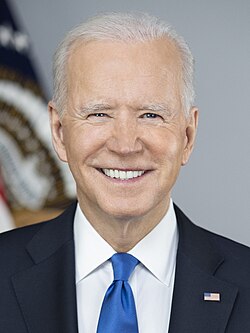 |
Joe Biden (b. 1942) [77] |
January 20, 2021 – January 20, 2025 |
Democratic | 2020 | Kamala Harris | |
| 47 |  |
Donald Trump (b. 1946) [76] |
January 20, 2025 – Incumbent |
Republican | 2024 | JD Vance | |
See also
Notes
- Presidents are numbered according to uninterrupted periods served by the same person. For example, George Washington served two consecutive terms and is counted as the first president, instead of the first and second, but Grover Cleveland and Donald Trump are counted twice, because their two terms were not consecutive. A vice president who temporarily becomes acting president under the Twenty-fifth Amendment to the Constitution is not counted, because the president remains in office during such a period.
- Political parties had not been anticipated when the Constitution was drafted, nor did they exist at the time of the first presidential election in 1788–89. When they did develop, during Washington's first term, Adams joined the faction that became the Federalist Party. The elections of 1792 were the first ones in the United States that were contested on anything resembling a partisan basis.[20]
- The 1796 presidential election was the first contested American presidential election and the only one in which a president and vice president were elected from opposing political parties. Federalist John Adams was elected president, and Jefferson of the Democratic-Republicans was elected vice president.[22]
- Died in office[25]
- Early during John Quincy Adams' term, the Democratic-Republican Party dissolved; his allies in Congress and at the state level were referred to as "Adams' Men" during the Adams presidency. When Andrew Jackson became president in 1829, this group became the "Anti-Jackson" opposition, and organized themselves as the National Republican Party.[28]
- John Calhoun, formerly a Democratic-Republican, founded the Nullifier Party in 1828 to oppose the Tariff of 1828 and advance the cause of states' rights, but was brought on as Andrew Jackson's running mate in the 1828 presidential election in an effort to broaden the democratic coalition led by Jackson.[29]
- Resigned from office[25]
- John Tyler succeeded to the presidency upon the death of William Henry Harrison.[34]
- John Tyler was elected vice president on the Whig Party ticket in 1840. His policy priorities as president soon proved to be opposed to most of the Whig agenda, and he was expelled from the party five months after assuming office.[35]
- Millard Fillmore succeeded to the presidency upon the death of Zachary Taylor.[39]
- When he ran for reelection in 1864, Republican Abraham Lincoln formed a bipartisan electoral alliance with War Democrats by selecting Democrat Andrew Johnson as his running mate, and running on the National Union Party ticket.[43]
- Andrew Johnson succeeded to the presidency upon the death of Abraham Lincoln.[44]
- While president, Andrew Johnson tried and failed to build a coalition of loyalists under the National Union banner. Near the end of his presidency, Johnson began reassociating with the Democratic Party.[44]
- Chester A. Arthur succeeded to the presidency upon the death of James A. Garfield.[49]
- Theodore Roosevelt succeeded to the presidency upon the death of William McKinley.[54]
- Calvin Coolidge succeeded to the presidency upon the death of Warren G. Harding.[59]
- Harry S. Truman succeeded to the presidency upon the death of Franklin D. Roosevelt.[63]
- Lyndon B. Johnson succeeded to the presidency upon the death of John F. Kennedy.[67]
- Appointed as vice president under terms of the Twenty-fifth Amendment, Section 2[25]
- Gerald Ford succeeded to the presidency upon the resignation of Richard Nixon. Even though Ford simply served out the remainder of Nixon's second term, he was never elected to the presidency or vice presidency in his own right.[69]
References
Works cited
External links
Wikiwand - on
Seamless Wikipedia browsing. On steroids.
